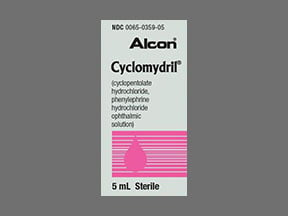
Cyclomydril Coupons & Savings Card – Discount Prices from $19.43
My prescription
Edit
2ML of 0.2-1%, Cyclomydril (1 Bottle)
Select pharmacy

CVS
$55.81
COUPON PRICE
Walmart
$19.43
COUPON PRICE
Albertsons
$27.16
COUPON PRICE
Walgreens
$27.16
COUPON PRICECyclomydril savings card
Show this card to your pharmacist
Walmart
$19.43
BIN
ID
PCN
GRP
019876
LH8E37CB72
CHIPPO
LHX
Powered by
More prescriptions for pupil dilation
More prescriptions for pupil dilation
Price history for Cyclomydril
1 Bottle, 2ML of 0.2-1%
Average retail price for Cyclomydril
Average SaveHealth price for Cyclomydril
Our price history data is based on aggregated prescription data collected from participating pharmacies in America. Our prescription data updates daily to reflect the latest price changes. If you notice a missing data point, it means there wasn't sufficient data available to generate a monetary value for that date.
*Retail prices are based on pharmacy claims data, and may not be accurate when we don't have enough claims.
Cyclomydril dosage forms
Dosage Quantity Price from Per unit 2ML of 0.2-1% 1 Bottle $19.43 $19.43 2ML of 0.2-1% 2 Bottles $57.86 $28.93 2ML of 0.2-1% 3 Bottles $88.05 $29.35
| Dosage | Quantity | Price from | Per unit |
|---|---|---|---|
| 2ML of 0.2-1% | 1 Bottle | $19.43 | $19.43 |
| 2ML of 0.2-1% | 2 Bottles | $57.86 | $28.93 |
| 2ML of 0.2-1% | 3 Bottles | $88.05 | $29.35 |
What is the drug Cyclomydril used for?
Cyclomydril is used to dilate the pupils and paralyze the muscles of the eye for diagnostic procedures. It is commonly used in ophthalmic examinations to allow healthcare professionals to better view the interior structures of the eye.
What is Cyclopentolate hydrochloride and phenylephrine hydrochloride?
Cyclopentolate hydrochloride is a medication used to dilate the pupil and temporarily paralyze the eye's focusing muscles, often used during eye examinations. Phenylephrine hydrochloride is a medication that also dilates the pupil by stimulating the muscles in the eye. Both are commonly used in ophthalmology to facilitate eye examinations and procedures.
What is the generic for Cyclomydril eye drops?
The generic for Cyclomydril eye drops is cyclopentolate and phenylephrine.
